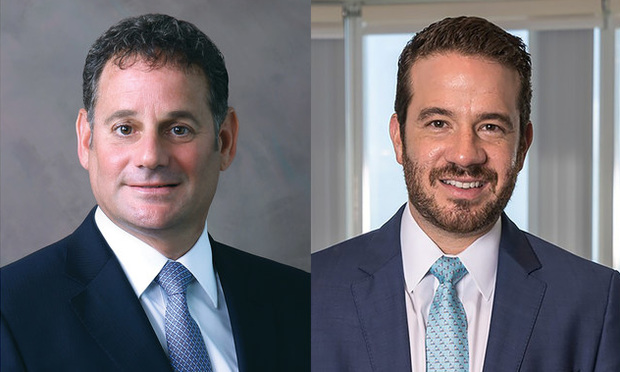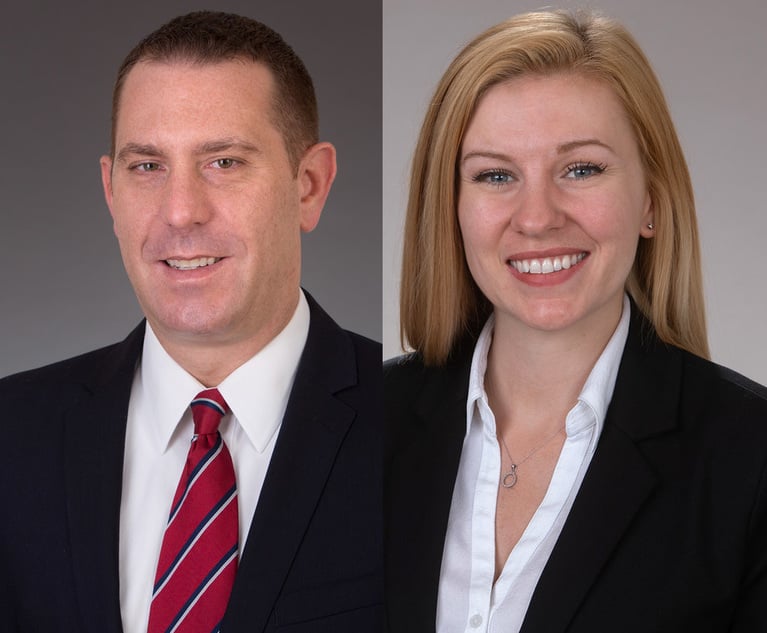Miami Lawyers Land $4.2M Judgment Against Swinerton Builders Over Late, 'Disorganized' Project
It was "know the documents or die" for Miami lawyers Scott Kravetz and Benjamin Brodsky, whose client prevailed in a two-week bench trial over a delayed construction project.
July 22, 2019 at 01:45 PM
6 minute read
 Scott D. Kravetz of Duane Morris and Benjamin H. Brodsky of Brodsky Fotiu-Wojtowicz in Miami secured a $4.2 million judgment for their developer client, who sued contractors over a yearlong delay . Courtesy photos.
Scott D. Kravetz of Duane Morris and Benjamin H. Brodsky of Brodsky Fotiu-Wojtowicz in Miami secured a $4.2 million judgment for their developer client, who sued contractors over a yearlong delay . Courtesy photos.
Miami attorneys Scott D. Kravetz of Duane Morris and Benjamin H. Brodsky of Brodsky Fotiu-Wojtowicz emerged from a bench trial with a $4.2 million judgment for the developer of a luxury apartment complex in St. Petersburg, who sued contracting giant Swinerton Builders Corp. and its daughter company over a yearlong delay.
After a two-week trial, Miami-Dade Circuit Judge Beatrice A. Butchko found that Cambridge Swinerton Builders Inc. breached its agreement with The Hermitage St. Pete LLC while constructing the apartment building—a $52 million project the plaintiffs lawyers claim was “completely disorganized.”
It's rare for a case like this to go to trial instead of settling, according to Kravetz and Brodsky, as litigation is intricate, expensive and hard-fought.
“It's easy to get fatigued,” Brodsky said. “The client can get sick of writing checks after a while. But this client had the fortitude and the courage in their convictions to stay the course.”
Both parties are major corporations. The plaintiff's parent company, Allen Morris Co., is one of the largest real estate firms in the southeast and built Florida headquarters for AT&T, Florida Power and Light, and Bank of America International. Defendant Swinerton, meanwhile, is one of the country's biggest construction companies and has built hotels, schools, hospitals, apartments and government buildings across the U.S.
Allen Morris had selected what was an up-and-coming neighborhood in the Tampa Bay area for The Hermitage complex, but frequent changes in Cambridge Swinerton's project management staff led to “predictable disarray,” according to Brodsky.
“People didn't know what was happening at the beginning of the job, the middle of the job or the end of the job,” Brodsky said. “It was just a rotating cast of characters.”
The developers eventually brought Swinerton's main San Francisco office in to help right the ship, and the project ”limped across the finish line,” as Brodsky put it. But it was more than a year late.
During that year, The Hermitage's $52 million in construction financing accrued interest, and no one was renting out the units.
“Every day that the developer can't rent a unit is a dollar lost, so they missed a whole year of revenue,” Brodsky said.
The Hermitage sued under a liquidated damages provision that both parties had agreed to in their 2014 contract, which said that if either party was found to be entitled to damages over project delays, they would accept a particular amount. That number would be calculated based on how many days the project was late and the amount of rentable space per square foot in the building, even if the actual damages were more or less than that.
The Hermitage claimed it was owed $4.2 million in liquidated damages, though Brodsky and Kravetz claim their client suffered a bigger loss.
The defendant denied any wrongdoing and swiped back with a counter-complaint, claiming the project was late because of the plaintiff's own mistakes and negligence. Swinerton sought liquidated damages plus about $3 million in outstanding payments.
Counsel to Swinerton, Melinda S. Gentile and Charles Fombrun of Peckar & Abramson in Miami did not respond to requests for comment by deadline.
1 million pages of documents
At trial, it was up to Butchko in the complex business division to decide why the project was late and who was to blame.
“Two long weeks” of dense, jargon-heavy testimony ensued, according to Kravetz, who felt the defendant had tried to settle the case by tiring out the plaintiff with new arguments and explanations.
“I firmly believe that this was a classic case of the contractor over-playing their hand, hoping that they would create litigation fatigue on behalf of the developer,” Kravetz said. “And fortunately, our client had the financial resources to go to the mat.”
It wasn't the type of case to take shortcuts, according to Brodsky.
“It's 'know the documents' or die,” Brodsky said.
Digging through more than a million pages of documents took pure “elbow grease,” according to Brodsky, who said the case hinged on finding “little nuggets” in the defendant's own emails, schedules and charts.
Kravetz and Brodsky said they had to fly around the country gathering depositions, and expert witnesses had to be flown in to testify. The attorneys also hired a consulting firm that used presentations and graphics to simplify and dissect each of the contractor's claims and explain why they had no merit.
But all of that doesn't come cheap, which can be off-putting for plaintiffs, according to Kravetz.
“Sometimes developer clients don't want to go spend in excess of $1 million on attorney fees and litigate a case for two or three years, only to end up going to trial and getting 40 cents or 50 cents on the dollar,” Kravetz said. “Our client had the financial resources to go to the finish line on this and prove that they were right, and they were vindicated.”
Butchko found the plaintiff was entitled to all of the liquidated damages it requested. With about $1.5 million in attorney fees, plus costs and interest factored in, Kravetz and Brodsky estimate their client could get between $6 million and $7 million.
Kravetz and Brodsky had never met before this case, but the developer threw them together after interviewing both their firms and struggling to decide. It turned out to be a strong match, according to Brodksy.
“That was the cool thing, to be with your buddy trying the case,” Brodsky said. “Even though we weren't at the same firm it felt like we were, and we locked our arms.”
Read Butchko's verdict transcript:
Case: The Hermitage St. Pete v. Cambridge Swinerton Builders
Case No.: 17-158272-CA-01
Description: Contract and indebtedness
Filing date: June 30, 2017
Verdict date: July 10, 2019
Judge: Miami-Dade Circuit Judge Beatrice A. Butchko
Plaintiffs attorneys: Scott D. Kravetz, Duane Morris, Miami; Benjamin H. Brodsky, Brodsky Fotiu-Wojtowicz, Miami
Defense attorneys: Melinda S. Gentile and Charles Fombrun, Peckar & Abramson, Miami
Verdict amount: $4,215,802
More verdicts and settlements:
South Florida Lawyers Secure $5 Million Settlement Over Car Dealer's Spam Texts
South Florida Lawyers Score $2.1M Verdict For Child Scarred After Bowling Alley Slip
Palm Beach Attorney Helped Land $10M for Families of Teens Killed in Wrong-Way Crash
This content has been archived. It is available through our partners, LexisNexis® and Bloomberg Law.
To view this content, please continue to their sites.
Not a Lexis Subscriber?
Subscribe Now
Not a Bloomberg Law Subscriber?
Subscribe Now
NOT FOR REPRINT
© 2025 ALM Global, LLC, All Rights Reserved. Request academic re-use from www.copyright.com. All other uses, submit a request to [email protected]. For more information visit Asset & Logo Licensing.
You Might Like
View All
South Florida Real Estate Lawyers See More Deals Flow, But Concerns Linger
6 minute read

Trending Stories
- 1'He Used Some Colorful Language': Yale Defamation Case Survives
- 2Man Charged in Daylong Shooting Rampage in Memphis Is Serving as His Own Lawyer
- 3Counterpoint: FLA Is Committed To the Success of Legal Professionals
- 4Pa. Superior Court Rules Pizza Chain Liable for Franchisee Driver's Crash
- 5New FCC Chair Hires Section 230 Critic as General Counsel
Who Got The Work
J. Brugh Lower of Gibbons has entered an appearance for industrial equipment supplier Devco Corporation in a pending trademark infringement lawsuit. The suit, accusing the defendant of selling knock-off Graco products, was filed Dec. 18 in New Jersey District Court by Rivkin Radler on behalf of Graco Inc. and Graco Minnesota. The case, assigned to U.S. District Judge Zahid N. Quraishi, is 3:24-cv-11294, Graco Inc. et al v. Devco Corporation.
Who Got The Work
Rebecca Maller-Stein and Kent A. Yalowitz of Arnold & Porter Kaye Scholer have entered their appearances for Hanaco Venture Capital and its executives, Lior Prosor and David Frankel, in a pending securities lawsuit. The action, filed on Dec. 24 in New York Southern District Court by Zell, Aron & Co. on behalf of Goldeneye Advisors, accuses the defendants of negligently and fraudulently managing the plaintiff's $1 million investment. The case, assigned to U.S. District Judge Vernon S. Broderick, is 1:24-cv-09918, Goldeneye Advisors, LLC v. Hanaco Venture Capital, Ltd. et al.
Who Got The Work
Attorneys from A&O Shearman has stepped in as defense counsel for Toronto-Dominion Bank and other defendants in a pending securities class action. The suit, filed Dec. 11 in New York Southern District Court by Bleichmar Fonti & Auld, accuses the defendants of concealing the bank's 'pervasive' deficiencies in regards to its compliance with the Bank Secrecy Act and the quality of its anti-money laundering controls. The case, assigned to U.S. District Judge Arun Subramanian, is 1:24-cv-09445, Gonzalez v. The Toronto-Dominion Bank et al.
Who Got The Work
Crown Castle International, a Pennsylvania company providing shared communications infrastructure, has turned to Luke D. Wolf of Gordon Rees Scully Mansukhani to fend off a pending breach-of-contract lawsuit. The court action, filed Nov. 25 in Michigan Eastern District Court by Hooper Hathaway PC on behalf of The Town Residences LLC, accuses Crown Castle of failing to transfer approximately $30,000 in utility payments from T-Mobile in breach of a roof-top lease and assignment agreement. The case, assigned to U.S. District Judge Susan K. Declercq, is 2:24-cv-13131, The Town Residences LLC v. T-Mobile US, Inc. et al.
Who Got The Work
Wilfred P. Coronato and Daniel M. Schwartz of McCarter & English have stepped in as defense counsel to Electrolux Home Products Inc. in a pending product liability lawsuit. The court action, filed Nov. 26 in New York Eastern District Court by Poulos Lopiccolo PC and Nagel Rice LLP on behalf of David Stern, alleges that the defendant's refrigerators’ drawers and shelving repeatedly break and fall apart within months after purchase. The case, assigned to U.S. District Judge Joan M. Azrack, is 2:24-cv-08204, Stern v. Electrolux Home Products, Inc.
Featured Firms
Law Offices of Gary Martin Hays & Associates, P.C.
(470) 294-1674
Law Offices of Mark E. Salomone
(857) 444-6468
Smith & Hassler
(713) 739-1250







